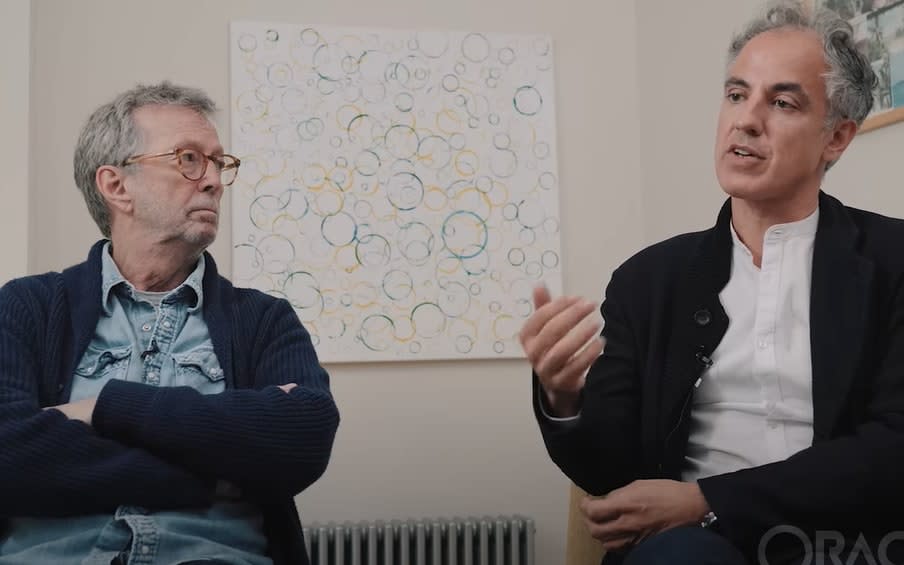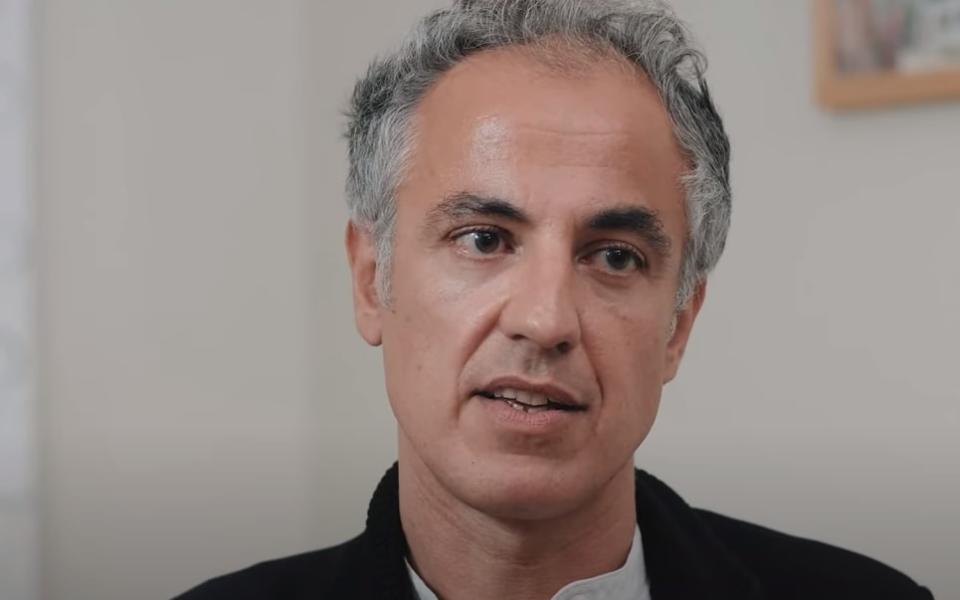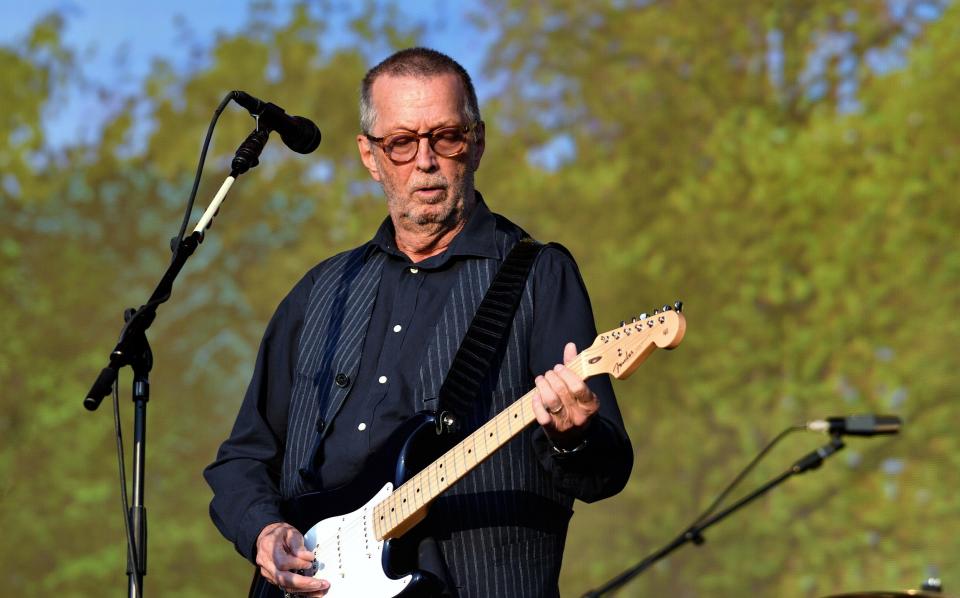Robin Monotti, the anti-lockdown architect who helped Eric Clapton find his voice

Like many political groupings, anti-lockdown campaigners are a difficult bunch to characterise. Some (like me) are simply in favour of lifting government restrictions now that the success of the vaccine programme and falling death rates means it is no longer necessary or feasible to keep society on hold.
Others have never been in favour of lockdown from the start, but accept that the virus posed a serious threat to vulnerable members of society and argued for different methods to combat the spread. Then there is a small but vocal bunch, mired in wacky conspiracy theory, who are opposed to just about everything to do with fighting the "scamdemic".
At first glance, it’s hard to know where Robin Monotti sits in this crowd. After years spent as an architect, film-maker and lecturer, Monotti has made something of a different name for himself over the past 16 months. Before Covid-19 became the word on everyone’s lips, he was known for his award-winning practice Robin Monotti Architects – in particular the Yacht House on the Crimean shoreline and his ‘Watering Holes’ drinking fountain in London’s Green Park.
Having also translated Woman Like Me, a book of short stories by Curzio Malaparte, Monotti is now working on a few film projects which have “emerged from conversations” with people throughout the last 16 months.
The Book of Vision, made before the pandemic by his newly founded film company Luminous Arts and executive produced by Terrence Malick, has been met with rave reviews. Featuring Charles Dance, Lotte Verbeek and Sverrir Gudnason, the film looks at the history of medicine and the relationship between doctors and patients – perhaps a prophetic idea given what was to follow after its completion.
Today, Monotti’s name winds up in the headlines for reasons other than luxury builds. His critical views on lockdown, vaccines and the virus itself landed him with a suspension from Twitter, forcing him to find a new following on alternative sites. His decision to publish Eric Clapton’s self-described “disastrous” experience of taking the AstraZeneca vaccine has caused some controversy. More recently, Clapton used the account to announced that he would refuse to play any venue that insists on vaccinated audiences.
Clapton initially got in touch with Monotti after a cameraman on a video shoot saw him watching an anti-lockdown speech by Conservative MP Desmond Swain, and recommended the architect's Telegram account. After a rigorous process of making sure it was the real Slowhand (asking him to describe a detail of a building he knew they both had visited), Monotti now talks almost “every day” with the star.
Clapton’s intervention caused a stir. The musician claimed that he feared he would “never play again” as his “hands and feet were either frozen, numb or burning, and pretty much useless for two weeks”. Clapton went on to claim that he had believed “the propaganda” which had “said the vaccine was safe for everyone” but that after meeting Monotti, he felt like “a veil had been lifted, that I was no longer alone”.
Together, they run a profile called Love Not Fear, a “community” for sceptics on which Clapton posts songs to provide an “uplifting” alternative to Covid-induced doom. The Telegram account is a mix of links to articles, commentary from vaccine sceptics and long paragraphs of links and graphs from Monotti and Mike Yeadon – the ex-Pfizer scientist turned vaccine critic who co-authored a debunked petition claiming that the drug caused infertility in women.
“He felt that he was benefiting from this community, and he wanted to give something back,” Monotti says of Clapton, “so he said, why don’t we issue [Clapton’s latest song with Van Morrison] Rebels on your channel? And so that’s how it happened.”
Understandably, Monotti was a little cautious about talking to me. A phone call from a journalist the morning after speakers in Trafalgar Square claimed that parliament was doing “the bidding of evil”, describing masks as “subjugation tools used by the freemasons”, would make even the mildest lockdown sceptic feel uneasy. “I will speak freely and your readers will decide what they think about it”, he told me. A good a start as any.
He begins by assuring me that he is not like other sceptics who don’t believe that the virus is real – “although it’s difficult to have definite scientific proof, we believe, in our family, that we had it”. At first, he says, his discussion of Covid-19 on Twitter was something of a public service – he worried that people who hadn’t had it couldn’t be objective, and might “over-blow it or under-blow it”.
He was also concerned that no one seemed to have an answer as to how to “cure” the illness. Monotti’s family, who all suffered from “very high fever, a lot of pneumonia, aches everywhere, infected digestive system, a bit of everything really” way back in December 2019 had access to a doctor who prescribed Azithromycin antibiotics.
In his words, his family saw “the disease reversing course”. When the UK government decided to lock down society just over two months later, Monotti said he felt compelled to act: “Can I just sit here and stay quiet when I’ve gone through it and seen people who I love turning around very quickly from quite a severe disease, or should I be sharing this with others?”

Fast forward a year, and Monotti’s views seem to have hardened. In a podcast recorded in January called ‘Geopolitics and Empire’, Monotti compared lockdowns to Nazi eugenicist programmes. “It’s not too dissimilar to the idea of a master race”, he said, “in the sense that if you question it you will be put in a concentration camp – or a quarantine camp in this situation”. It quickly becomes clear that Monotti is used to playing hard and soft with the way in which he portrays his opposition to the vaccine. Talking to me, someone who volunteers as a vaccinator, Monotti is measured.
He bristles at the term anti-vaxxer, one which he says puts an unfair label on what he deems a perfectly legitimate viewpoint. “I do not believe in a generic approach to medicine”, he says.
“Medicine has to be highly specific to every single body and every single mind out there, and therefore what I generally oppose overall is this blanket ‘one solution fits all’ approach that becomes inevitable if a government gets involved”.
However, when asked about the more extremist anti-vaccine rhetoric, Monotti is slippery. The Saturday Trafalgar Square protest was a nightmare for sensible lockdown-critical voices, as political extremists stood up and took turns denouncing satanic vaccines, hidden truths and demonic globalist plots. Did he not think it necessary for someone like him, a respected architect who began his journey claiming to seek objective truth, to call out mad behaviour when he sees it?
“Every single one of those people has an audience that they are talking to, and people react to different ways of talking with different language, different metaphors, different comparisons”, he tells me.
In short, Monotti is perfectly happy for Kate Shemirani to get on stage and refer to Nuremberg trials in relation to doctors and nurses administering the vaccine: it’s simply a metaphor. Does he agree with them? “Well, I obviously would give a different speech”, he says. It’s all a bit Dominic Cummings – it doesn’t matter what the message is, just as long as it works.
What would be in Monotti’s speech? A mix of supplement recommendations (he is a big fan of Vitamin D and argues that lockdown prevented people from getting sunlight, making them more at risk from the virus) and dubious claims of “tens of thousands of deaths” caused by the vaccine. His Monotti Protocol for Keeping Society Open, published in March this year, is a Great-Barrington-Declaration-style alternative to vaccinations, prescribing a “test kit” of aspirin, antibiotics, vitamins and Omega-3 to combat the virus.
It’s about as batty as the people who blow six quid on crystal deodorants from Whole Foods. But the views of Monotti and other vaccine-sceptic aren’t simply a matter of personal health. The rejection of mass vaccination is a rejection of the social and collective nature of the way in which this virus needs to be fought.
After an hour talking to the soft-spoken Italian, it became clear that Monotti wasn’t the sort of lizards-and-Satan believer that the term ‘anti-vaxxer’ can sometimes conjure up. In fact, Monotti’s opposition to the vaccine (and lockdown) has more to do with a middle-class homeopathic scepticism of modern medicine. What seems to have been lost is the irony of him and Eric Clapton – who for years didn’t think twice about the efficacy or content of substances he stuck up his nose – considering themselves “rebels” for peddling theories you might expect to hear in Bristol health shops.
While I won’t go along with Monotti’s theories about eugenicist regimes and Vitamin D deficiency, or his rejection of the broad scientific agreement on the safety and success of the vaccine, I do agree with his condemnation of censorship. Having had several accounts suspended on Twitter for tweeting quotes from philosophers, graphs about case rates and deaths (some credible, some debunked), Monotti was forced to give up his audience – many fans of his architecture as well as his Covid views. He describes the attacks on his free speech as “very similar to burning books in a square – it’s just a digital version”.

Putting aside his penchant for Nazi comparisons, he’s right to be concerned about the silencing of debate on Covid, lockdown and everything in between. Recent revelations about lab leaks, the conflicting messaging over masks and the mistakes made by the Government when it came to dealing with care homes shows that it’s perfectly possible – and often sensible – to be sceptical about official narratives without falling into conspiracy theories.
“What happens to a society when you say that a section of that society is not welcome anymore?” Monotti asks, referencing the threat of vaccine passports for public gatherings. What many pro-vaccine commentators seem to miss is that a ‘scientific approach’ is one that always asks questions. Silencing even the most extreme opposition to vaccines and lockdowns does nothing for the enlightened, pro-science view that so many of us have embraced with our willingness to get jabbed.
Instead, it gives succour to those who get up on stages in Trafalgar Square to tell crowds of people that the powers that be “don’t want you to know” about the 5G dangers of Pfizer. But free speech comes with responsibility – and if Monotti or others want to take umbrage with being dismissed as cranks, they have to start calling out the madness in the mess of lockdown-sceptic thought. Someone from the crowd on Saturday should have challenged the misinformation coming from the stage as soon as the second member of the Icke family got to the mic.
Better still, those of us who don’t subscribe to alarmist theories would do well to embrace debate as a means of figuring out what we believe to be true. Who knows, Monotti could possibly be right about the benefits of Vitamin D when it comes to Covid-19 – but one thing we do know is that sunlight and exposure has always been the best disinfectant for dodgy views.

